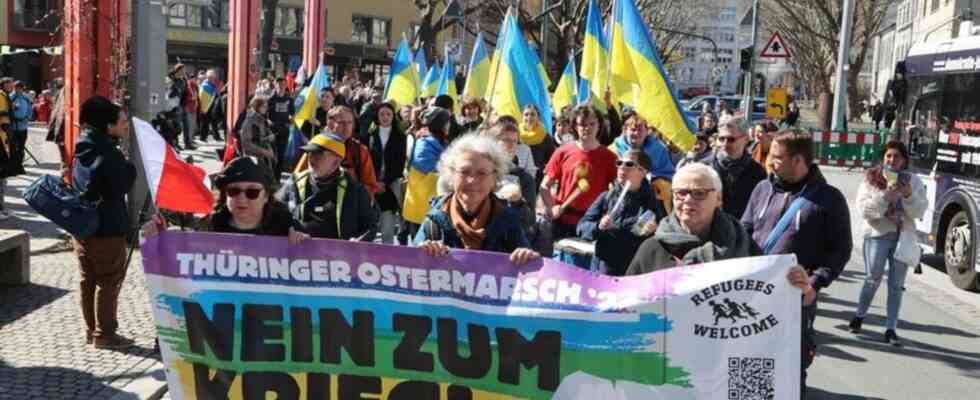demonstrations
“Stop the arms mania”: Easter marches in German cities
Participants in an Easter march walk through the city center in Jena after a rally on the Holzmarkt. Photo: Bodo Schackow/dpa
© dpa-infocom GmbH
People took to the streets nationwide during Easter marches. They set an example for peace – and protest against rearmament. Controversial this time given the war in Ukraine.
A few thousand people nationwide have joined the Easter marches of the peace movement. In cities like Hanover, Munich, Duisburg, Stuttgart, Leipzig and Berlin, demonstrators gathered on Saturday with flags and placards.
The rallies were aimed, for example, against the Russian war in Ukraine and the planned billions in expenditure for the German armed forces.
“Our demands for peace and disarmament are more relevant than ever, also with a view to the risk of a possible nuclear escalation,” said Kristian Golla from the Peace Cooperation Network. According to him, around 80 protests had been announced for Saturday, including in smaller towns.
According to police estimates, around 1,200 people came together in Bremen and Berlin and more than 500 demonstrators in Hanover. In Duisburg and Cologne, too, hundreds of demonstrators took part in kick-off events for the three-day Rhine-Ruhr Easter March.
“No to war”
Posters and banners read, for example, “No to war”, “Stop the arms mania”, “Negotiate! instead of risking World War III” and “Those who supply weapons will reap war”. A large dove of peace was mounted on a car roof in Berlin. Some posters were directed against plans by the federal government to provide 100 billion euros for major defense policy projects.
This time, some of the demands of the peace movement caused discussions in advance. The motto “Create peace without weapons” is currently an arrogance towards the people in Ukraine, said former Bundestag President Wolfgang Thierse (SPD) to the Bavarian radio. “Pacifism at the expense of others is cynical.”
Vice Chancellor Robert Habeck (Greens) told the newspapers of the Funke media group that pacifism was “a distant dream” at the moment. Russian President Vladimir Putin broke all the rules of international law. If the idea of the Easter marches is peace, one must be clear: “Peace can and will only exist if Putin stops his war of aggression.” He also said it was clear “who is the aggressor in this war and who is defending in dire need and who we must support – including with weapons.”
Expert: Think about who you go out on the street with
The researcher Claudia Baumgart-Ochse spoke in the rbb-Inforadio for a differentiated view of the peace movement. The impulse to demonstrate for peace is initially a good thing, said Baumgart-Ochse from the Leibniz Institute Hessian Foundation for Peace and Conflict Research. However, she advised that you think carefully about who you are going out with, who is organizing it and what the reasons for the protest are. In some calls, she has the impression that Russian propaganda shines through.
A second demonstration took place in Berlin parallel to the traditional Easter march. On Bebelplatz, among other things, Ukrainian flags were used to demonstrate against the Russian war of aggression. In a call, the campaign was described as an “alternative Easter march”. It was criticized that the peace movement’s call for the traditional Easter march made no mention of Russian aggression and the right to self-defense. The demonstrators called for “Heavy weapons now!” on posters.
The first Easter marches had already taken place on Thursday and Friday. More demonstrations are planned. For example, the peace movement is calling for a rally in front of the Büchel Air Force Base in Rhineland-Palatinate on Easter Monday.

